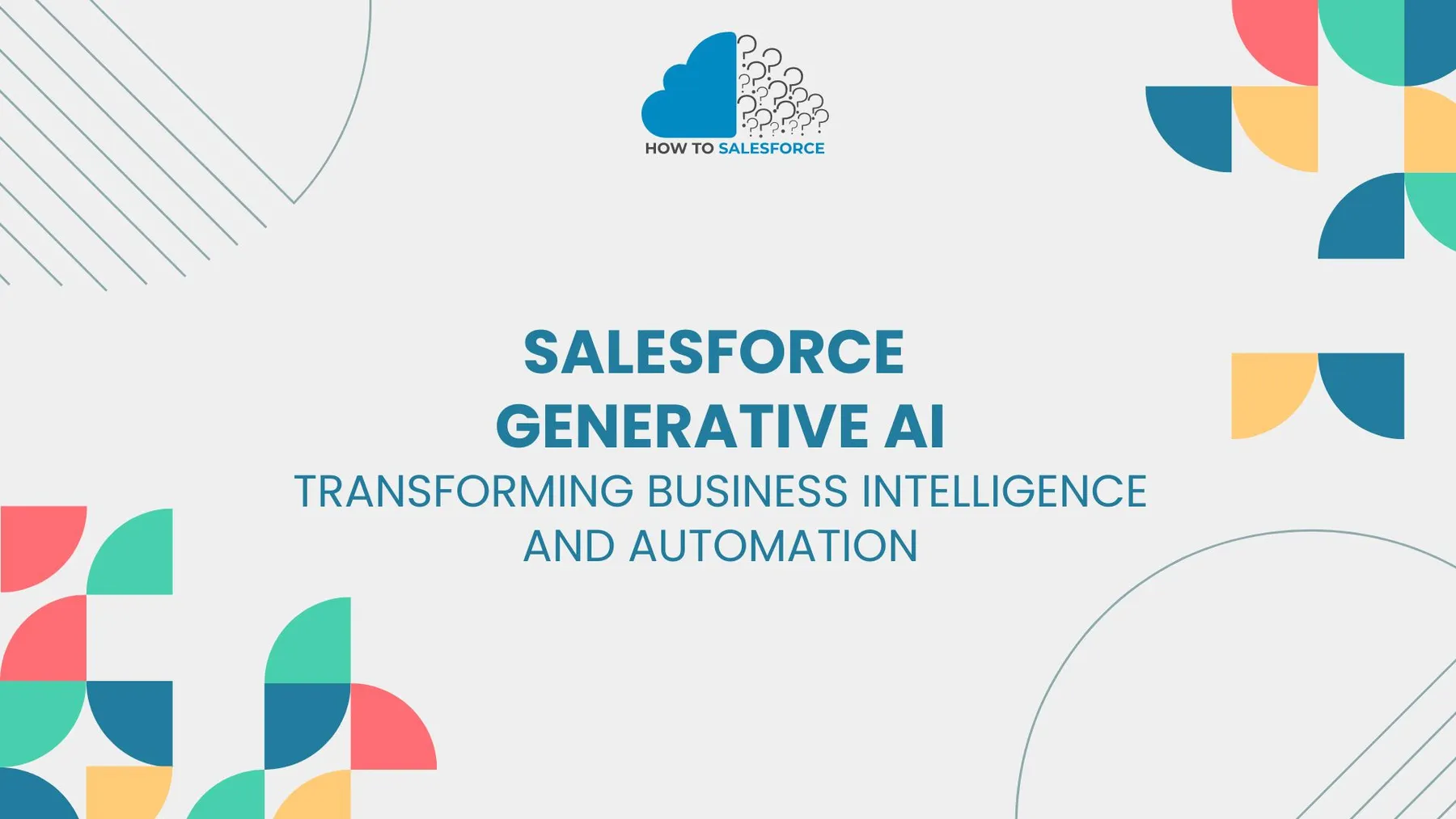Introduction
Salesforce Generative AI revolutionizes corporate operations by providing creative ways to optimize workflows and enhance customer experiences. Integrating AI with Salesforce enables businesses to offer tailored services, improving efficiency and decision-making in today’s fast-paced world. Let’s investigate the fascinating opportunities that Salesforce Generative AI provides.
Please read my other blog, Salesforce Tower SF
Understanding Salesforce Generative AI
First, it fuses state-of-the-art artificial intelligence with Salesforce’s powerful CRM platform. This AI model adapts to business needs by producing new material, insights, and solutions. As a result, businesses can enhance decision-making through process automation.
What is Generative AI
Artificial intelligence, called “generative AI, can produce original text, graphics, and code. When used with Salesforce, it may produce tailored messages, answers, and insights, enhancing customer interaction and streamlining operations.
Why Salesforce Chose Generative AI
Salesforce understood that CRM needed to be more flexible and individualized. The platform’s integration of generative AI enables organizations to analyze customer data more effectively, forecast trends, and provide customized solutions in real-time.
Benefits of Salesforce Generative AI
Moreover, companies that use Salesforce Generative AI have enhanced operational efficiency, quicker decision-making, and more individualized client engagements. The technology’s numerous significant benefits have the potential to alter how businesses operate in the digital age fundamentally.
Enhanced Customer Personalization
First, thanks to Salesforce Generative AI, companies can offer incredibly tailored customer experiences. Studying user behavior may produce personalized messages, suggestions, and solutions based on unique needs, aiding businesses in forging closer bonds with their clients.
Streamlined Processes
Furthermore, AI can automate several corporate operations. It can, for instance, compose customer service messages, automatically compile sales reports, and provide material for marketing campaigns. Because manual labor is substantially reduced, employees have more time to devote to strategic responsibilities.
Applications of Salesforce Generative AI
Salesforce Generative AI will have several valuable uses in corporate settings. Its skills, which range from customer service to marketing and sales, are transforming how firms approach routine activities by providing more intelligent and practical solutions.
Sales and Marketing Automation
Sales and marketing automation is one of the most well-known uses of generative AI. Businesses may use it to provide customized sales pitches, dynamic marketing material, and customer preference prediction, which will increase conversion rates.
Customer Service Transformation
Additionally, Salesforce Generative AI offers automated, real-time help, completely altering customer service. The AI can escalate concerns and analyze client requests to provide relevant solutions when needed, guaranteeing more client satisfaction and quicker resolutions.
Integrating Salesforce Generative AI into Your Business
Before implementing it, businesses need to know how it integrates with their current workflows. This section covers the actions companies should take to incorporate this technology into their operations.
Identify Use Cases
Organizations should first determine which sectors benefit most from Salesforce Generative AI. Clearly defining use cases ensures that artificial intelligence (AI) improves sales, marketing, or customer service operations.
Training Employees
The next crucial step is to teach staff members how to use the AI. If they are familiar with its possibilities, your staff can fully utilize the AI’s features and increase productivity and customer experiences.
Salesforce Generative AI vs. Traditional AI
There are noticeable functional differences between Salesforce Generative AI and conventional AI models. Generative AI goes beyond traditional AI by producing fresh, creative solutions, while traditional AI concentrates on predictive analysis. Let’s examine these distinctions in more detail.
Traditional AI
Conventional AI mainly uses data analysis to forecast and suggest future actions. Based on past data, it aids companies in predicting customer behavior, predicting trends, and streamlining operations. It cannot, however, independently provide fresh thoughts or content.
Generative AI
Conversely, it generates fresh content while customizing it to the company’s requirements. In terms of email generation, marketing messaging, and customer service responses, generative AI provides a more adaptable and dynamic method.
Challenges of Implementing Salesforce Generative AI
Despite its many benefits, deploying it can be challenging. Businesses must know potential roadblocks and plan appropriately to guarantee a successful transition. Let’s discuss a few of the most typical problems.
Data Privacy and Security Concerns
First, data protection is still a significant concern when incorporating AI into customer relationship management. It depends highly on consumer data, so businesses must follow stringent data protection guidelines to preserve client information.
Cost and Resource Allocation
Furthermore, implementing AI solutions involves a significant financial and resource commitment. Businesses must set aside enough money for staff training, hardware, and software. However, frequently, the long-term advantages outweigh the upfront expenses.
Future Trends
Looking ahead, it offers many intriguing possibilities. We anticipate more developments as technology advances, improving AI’s potential in CRM. Companies that want to remain competitive need to keep up with these changes.
Advanced Personalization
AI will soon offer experiences that are even more tailored to the individual. More in-depth analysis of consumer behavior patterns will enable companies to provide personalized recommendations and services in real time.
AI-Driven Analytics
Furthermore, generative AI will continue to revolutionize corporate analytics. Real-time analytics can help businesses make better decisions, increasing productivity and spurring growth. Anticipate a significant role for AI in strategic decision-making procedures.
Real-World Examples
Several businesses have effectively used Salesforce Generative AI. These case studies show how this technology transforms several industries and showcase how it may improve consumer experiences and operational efficiency.
Retail Industry Success
One large retail chain, for example, included Salesforce Generative AI in its marketing and sales processes. The company’s income increased dramatically due to the AI’s assistance in creating targeted email campaigns, improving client targeting, and generating more sales leads.
Finance Sector Case Study
In finance, a large bank used Salesforce Generative AI to improve customer service. The AI-generated responses to everyday inquiries reduced wait times and enhanced client satisfaction, increasing customer retention.
Salesforce Generative AI and Ethical Considerations
Lastly, the growing use of AI in business raises ethical issues. Despite its unique nature, it must be used responsibly to maintain accuracy, fairness, and transparency in its operations. Developing ethical AI procedures is essential to winning over customers’ trust.
Avoiding Bias in AI Algorithms
One ethical challenge is ensuring that AI algorithms remain unbiased. AI systems can sometimes reflect societal biases, leading to unfair outcomes. Therefore, businesses must regularly audit their AI models to avoid discriminatory practices.
Ensuring Transparency and Accountability
Transparency is also essential when utilizing AI. Companies need to be transparent with their clients about how AI systems utilize and create their data. In AI-driven operations, clear communication upholds responsibility and trust.
Conclusion
It transforms how companies interact with clients, optimize workflows, and make choices. With its ability to automate tasks and improve personalization, this technology presents unmatched growth prospects. To realize the full potential of Salesforce Generative AI, businesses seeking to stay competitive should consider incorporating it into their operations.


